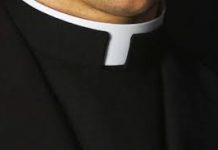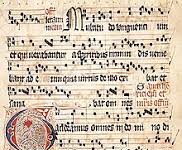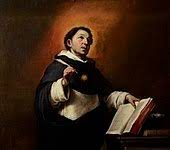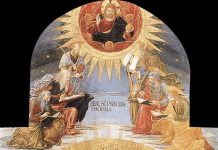Abide in me as I abide in you. Just as the branch cannot bear fruit by itself unless it abide in the vine, neither can you unless you abide in me. (Jn. 15:4).
In today’s Gospel reading, Our Lord speaks of the reality of our union with Him as a mutual indwelling (perichoresis). Abide in me as I abide in you. These words are not meant to be understood metaphorically or symbolically. They express the reality of our life in Christ through the Sacraments, especially the union that is brought about or effected through the Blessed Eucharist or what we logically call Holy Communion. As Christians, we bear the name of Christ and though each one of us is rightly constituted as an individual, through our mutual indwelling with our Lord, we share in His life. No words of Scripture express this truth as effectively as this well-known verse from St. Paul’s Epistle to the Galatians: “I have been crucified with Christ; it is no longer I who live, but Christ who lives in me; and the life I now live in the flesh I live by faith in the Son of God, who loved me and gave himself for me” (2:20).
When we renewed our Baptismal promises on Easter Sunday, we effectively vowed to deepen our union with Christ our Lord and to live the mystery of this life in all its fullness. In the traditional order in which the Sacraments are conferred, the Sacrament of the Eucharist completes our initiation in the Mystery of Christ. This is reflected in the liturgical season of Easter. Easter Sunday recalls our Baptism; Pentecost, our Confirmation; and the Solemnity of Corpus Christi, the Blessed Eucharist, the Sacrament in which we experience our Lord’s indwelling in a manner that is most intimate and personal. The Sacred Liturgy forms Christ in us so that we make our own the words of St John the Baptist: “He must increase, but I must decrease” (Jn. 3:30).
This unity or mutual indwelling is what we experience especially when we receive Holy Communion. Jesus Himself bore witness to the reality of this unity when He said: “He who eats my flesh and drinks my blood lives in me and I in him” (Jn. 6:56). This then, is our union with the Son, a union brought about through the Eucharist. Our Lord also said: “As the living Father sent me and I draw life from the Father, so he who eats my flesh will draw life from me” (Jn. 6:57). If we but take these words at face value, we see how great is our dignity; that God Himself shares His life with us and we also see how absolutely necessary it is for us to examine how and with what dispositions we approach the Altar for Holy Communion. Our devout participation in the Holy Sacrifice of the Mass is a clear expression of our understanding that the desired end or goal of our participation in the Church’s sacramental life is an experience of and a participation in the Mystery of God’s life, a mutual indwelling; a communion with the Father, and the children of the Father, God and neighbour. The Mass is a weekly reminder of the transcendent purpose of our life and it is always a much needed reminder because it is very easy for us to lose our way; and when this happens it is also easy to lose oneself.
The gift of salvation is not something external – simply a state received; but a sharing in the communion of life that is God. It is a work that Jesus accomplishes both for us and with us. If this is what we affirm to be true about revelation and salvation, then we must also affirm that God can only be truly known in a personal way; through prayer. When we arrive at this truth, everything changes because we change and we deliberately endeavour to be transformed into God’s likeness. We become aware of our dignity, we recognize the dignity of every person and we begin also to understand the mystery of the Church established by Jesus Christ as a communion of life, love and truth (Lumen Gentium, 9).
In the Mass we are one with our Lord in His Sacrifice and this Mystery is the source of our never-ending renewal and transformation. Here we heed the Apostle’s exhortation: “I appeal to you … by the mercies of God to present your bodies as a living sacrifice, holy and acceptable to God, which is your spiritual worship” (Rom. 12:1). St. Peter Chrysologus explains: “Each of us is called to be both a sacrifice to God and His priest. Do not forfeit what divine authority confers on you. Put on the garment of holiness…. Keep burning continually the sweet-smelling incense of prayer. Take up the sword of the spirit. Let your heart be an altar. Then with full confidence in God, present your body for sacrifice. God desires not death, but faith; God thirsts not for blood, but for self-surrender; God is appeased not by slaughter, but by the offering of your free will” (St. Peter Chrysologus, Sermon 108, Liturgy of the Hours, Vol. II, p. 772). The offering of our very selves in imitation of our Saviour is a logical consequence of this mutual indwelling that is ours in Christ our Lord who has left us an example; that we should follow in his footsteps (Cf. 1Pet. 2:21). Each Sunday, daily even, we have the privilege of celebrating the immolation of Christ sacramentally in the Eucharist. Each Sunday is truly a new beginning of our lives until at last, having gone from Sabbath to Sabbath we enter into the rest of God in the eternal Sabbath; when God the Father calls us to Himself to dwell in the Heavenly Jerusalem, the city that gleams with the splendour of God (Cf. Rev. 21:11).
The prayer of the Mass, especially our prayer of adoration and thanksgiving, is extended in the form of prayer known as Eucharistic Adoration. During his long pontificate Pope St. John Paul II did very much to foster Eucharistic Adoration because the practice had almost disappeared in many parts of the world. In a document he reminded us: “The Church and the world have great need for Eucharistic worship. Jesus waits for us in this sacrament of love. Let us be generous with our time in going to meet Him in adoration and contemplation that is full of faith and ready to make reparation for the great faults and crimes of the world. May our adoration never cease: (Apostolic Exhortation On the Mystery and Worship of the Eucharist, Dominicae Cenae, February 24, 1980). As we begin the month of Our Lady, may Our Lady of the Blessed Sacrament obtain for us a deep and generous devotion to the Mystery of the Eucharist for this is the Mystery that we celebrate and venerate and on this Mystery we pattern our lives.











